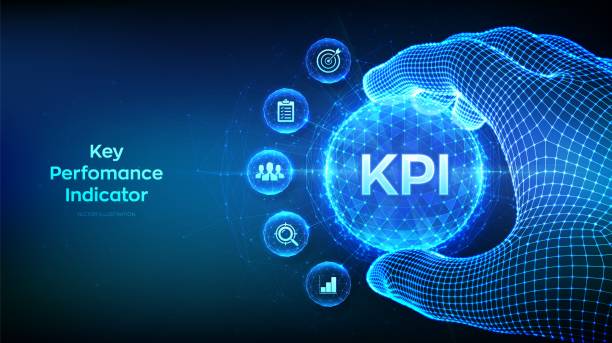What is On-page SEO and why is it important?

What is On-page SEO?
#On-Page SEO refers to a set of techniques and actions we perform within our website to improve its ranking in search engines like Google.
These actions include optimizing content, site structure, HTML tags, and other page-related factors.
The main goal of on-page SEO is to increase the relevance and ranking of a website in search results (SERP) and consequently increase organic website traffic.
Why is On-page SEO important?
On-page SEO is very important for the following reasons:
- Improved search engine ranking: By optimizing internal site elements, the chance of appearing on the first pages of search results increases.
- Increased organic traffic: Higher rankings in search results lead to an increase in visitors through organic search.
- Improved user experience: On-page SEO helps improve site structure and content, which enhances user experience.
- Reduced advertising costs: By increasing organic traffic, the need for paid advertising decreases.
In fact, on-page SEO is one of the most fundamental steps in website optimization, and without it, other efforts in off-page SEO may not yield the desired results.
On-page SEO helps search engines better understand the site and provides relevant and high-quality content to users.
In summary, on-page SEO is a valuable investment for any website looking for growth and success in the online space.
On-page SEO helps you optimize your website.
Does your current corporate website present a worthy image of your brand and attract new customers?
If not, turn this challenge into an opportunity with Rasaweb’s professional corporate website design services.
✅ Significantly improves your brand’s credibility and image.
✅ Paves the way for attracting leads and new customers.
⚡ For free and specialized consultation, contact Rasaweb now!
Keyword Research – The First Step in On-Page SEO

Why is Keyword Research important?
Keyword Research is the process of identifying words and phrases that users employ to search for information in search engines.
This process is crucial for understanding audience needs and interests and optimizing website content based on these needs.
Without keyword research, it’s impossible to produce content that is appealing to the target audience and understandable to search engines.
How to find suitable keywords?
To find suitable keywords, you can use various tools such as Ahrefs, Moz Keyword Explorer, Ubersuggest, and Google Keyword Planner.
These tools help you identify keywords relevant to your business and analyze their search volume, competition, and related suggestions.
Additionally, you can use the following techniques:
- Competitor analysis: Check what keywords your competitors are using.
- Using Google Suggest: When you search for a phrase on Google, examine Google’s suggestions.
- Analyzing frequently asked user questions: Questions users ask in forums and social networks can be good ideas for keywords.
After identifying keywords, you should prioritize them based on search volume, competition, and relevance to your business.
Keywords with high search volume and low competition are usually better options.
On-page SEO helps you improve your site’s ranking by using appropriate keywords.
You should note that long-tail keywords have higher conversion rates.
On-page SEO is very important at this stage.
Optimizing Page Title and Meta Description
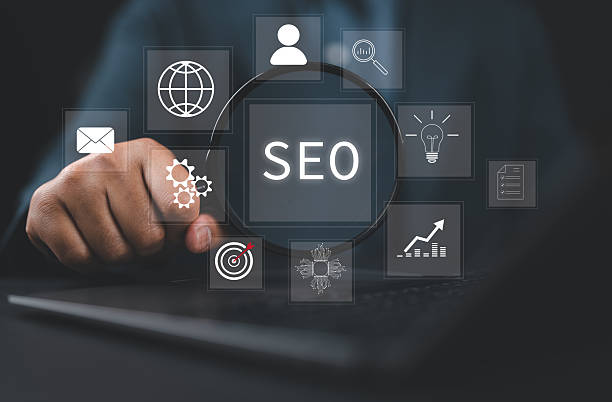
Importance of Page Title (Title Tag)
The page title (Title Tag) is one of the most important on-page SEO factors that helps search engines and users better understand the page content.
The page title is displayed in search results and plays a crucial role in attracting users to your website.
Tips for writing an optimized page title
- Use the main keyword: The main keyword should be present in the page title.
- Appropriate length: The page title length should be between 50 to 60 characters.
- Attractive and descriptive: The title should be attractive and descriptive to encourage users to click.
- Unique: Each page should have its own unique title.
Importance of Meta Description
The Meta Description is a summary of the page content that appears in search results below the page title.
Although meta descriptions do not directly affect site ranking, they play an important role in attracting users to the website.
The meta description should be engaging, descriptive, and relevant to the page content.
Tips for writing an optimized meta description
- Use keywords: The main keyword should be present in the meta description.
- Appropriate length: The meta description length should be between 150 to 160 characters.
- Call to Action: Use phrases like “Read more”, “Shop now”, etc.
- Unique: Each page should have its own unique meta description.
Optimizing the page title and meta description are among the essential on-page SEO actions that help improve site ranking and increase traffic.
On-page SEO in this section helps you present your content more optimally.
| Feature | Description |
|---|---|
| Title Tag Length | Between 50 to 60 characters |
| Meta Description Length | Between 150 to 160 characters |
| Keyword | Must be present in title and description |
| Attractiveness | Must be attractive and descriptive |
Optimizing Page Content for SEO

Importance of Content Optimization
Content is king! This phrase is very common in the world of SEO and indicates the high importance of content in website rankings.
High-quality, relevant, and optimized content can improve a site’s ranking in search engines and increase organic traffic.
On-page SEO heavily focuses on content.
Tips for Content Optimization
- Use keywords: Keywords should be used naturally in the text.
- Proper structure: Content should have a suitable structure (heading, subheading, paragraph).
- Readability: Content should be readable and understandable.
- Use images and videos: Images and videos can make the content more engaging.
- Content updates: Content should be regularly updated.
One of the most important factors in on-page SEO is high-quality content that must be continuously updated.
On-page SEO helps you improve your site’s ranking by providing relevant content to users.
On-page SEO can lead to increased website traffic.
On-page SEO also includes optimizing images and videos.
For example, using alt tags for images can help search engines understand the image content.
Also, using videos can increase user dwell time on the site, which is also positive for SEO.
On-page SEO means producing valuable and SEO-optimized content.
On-page SEO helps you get seen in search results.
Losing potential customers due to an unprofessional website? Rasaweb is your answer! With our specialized corporate website design services:
✅ Enhance your business’s credibility and standing.
✅ Experience attracting more targeted customers.
⚡ Act now to receive a free consultation!
Image Optimization for SEO
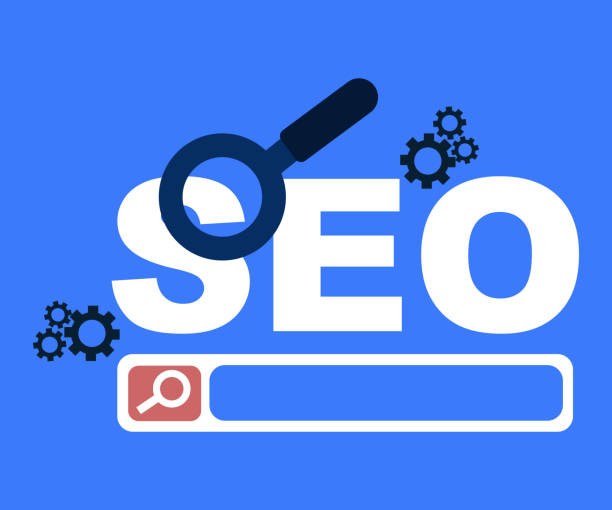
Why is Image Optimization important?
Images play an important role in website attractiveness and user experience improvement.
However, unoptimized images can reduce site loading speed and negatively impact SEO.
Image optimization means reducing image size without losing quality, using the appropriate format, and adding alt text.
Tips for Image Optimization
- Reduce image size: Use tools like TinyPNG or ImageOptim to reduce image size.
- Choose appropriate format: JPEG format is suitable for photos, and PNG format for graphic images.
- Use alt text: Alt text helps search engines understand the image content.
- Appropriate file name: The image file name should be relevant to the image content.
Image optimization is one of the important aspects of on-page SEO.
By optimizing images, you can improve site loading speed and provide a better user experience.
On-page SEO plays a vital role in this regard.
Also, ensure your images are responsive and display correctly on different devices.
Using HTML5 features like `srcset` and `sizes` can help you in this area.
On-page SEO helps you optimize your site’s images.
Improving URL Structure and Internal Links
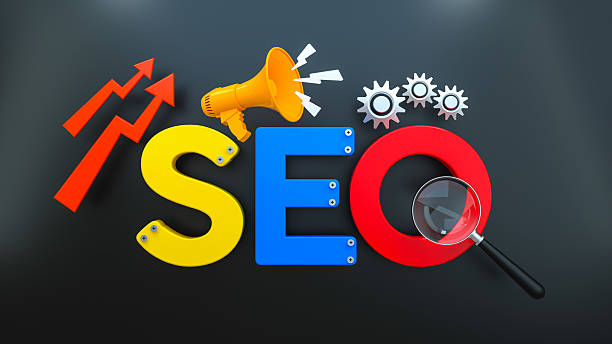
Importance of URL Structure
URL structure is an important on-page SEO factor that helps search engines and users better understand the page content.
Optimized URLs should be short, descriptive, and contain keywords.
Tips for improving URL structure
- Short and descriptive: The URL should be short and descriptive.
- Use keywords: The keyword should be present in the URL.
- Use hyphens: Use hyphens (-) to separate words.
- Avoid special characters: Avoid using special and unnecessary characters.
Importance of Internal Links
Internal Links are links that connect different pages of a website.
Internal links help search engines better understand the site structure and identify more important pages.
Also, internal links can help improve user experience and guide users to relevant pages.
Tips for using internal links
- Link to relevant pages: Links should point to pages relevant to the current page’s content.
- Use Anchor Text: The anchor text should be relevant to the destination page’s content.
- Appropriate number of links: The number of internal links on each page should be suitable.
On-page SEO helps you optimize your site’s URL structure and internal links.
Correct use of internal and external links can help improve site ranking.
On-page SEO can have a significant impact in this area.
With proper on-page SEO, your site’s important pages will be seen more.
Page Load Speed Optimization

Why is Page Load Speed important?
Page Speed is an important factor in on-page SEO and user experience.
Users expect website pages to load quickly, and loading delays can lead to users abandoning the site.
Search engines also value page load speed, and sites with higher loading speeds achieve better rankings in search results.
On-page SEO helps you improve page load speed.
Tips for improving page load speed
- Image optimization: High-volume images can reduce page load speed.
- Using CDN: Using Content Delivery Networks (CDN) can improve page load speed.
- File compression: Compressing CSS, JavaScript, and HTML files can reduce file size.
- Code optimization: Optimizing code and removing unnecessary code can improve page load speed.
- Using caching: Using browser caching can improve page load speed for returning visitors.
To check your site’s speed, you can use various tools such as Google PageSpeed Insights to analyze your site’s speed.
And optimize your site for on-page SEO and high search engine rankings.
| Factor | Impact on Speed |
|---|---|
| Image Size | Reduces load speed |
| Using CDN | Improves load speed |
| File Compression | Improves load speed |
| Code Optimization | Improves load speed |
Mobile Optimization

Why is Mobile Optimization important?
With the increasing use of mobile devices for searching and accessing the internet, website optimization for mobile (Mobile Optimization) has become very important.
Search engines also value website compatibility with mobile, and sites optimized for mobile achieve better rankings in search results.
On-page SEO helps you optimize your website for mobile.
Tips for optimizing your website for mobile
- Responsive Design: Using responsive design allows the website to automatically adapt to the screen size of different devices.
- High load speed: Page load speed on mobile should be high.
- Use readable fonts: Fonts used on the website should be readable on mobile devices.
- Avoid using Flash: Avoid using Flash on your website.
- Navigation optimization: Website navigation should be easy and usable on mobile devices.
Mobile optimization is a vital component of on-page SEO.
On-page SEO helps you optimize your website for different devices.
Ensure that your website works well on all devices.
Is your current e-commerce site design causing you to lose customers and sales?
Rasaweb is your solution with modern and user-friendly e-commerce website designs!
✅ Significant increase in conversion rates and sales.
✅ Creation of strong branding and building customer trust.
⚡ Get a free e-commerce website design consultation from Rasaweb!
Using Schema Markup for SEO

What is Schema Markup?
Schema Markup is a code added to a website that helps search engines better understand the page content.
Schema Markup provides additional information about the page content and can lead to the display of richer information in search results.
On-page SEO can be improved by using Schema Markup.
Benefits of using Schema Markup
- Display richer information in search results: Schema Markup can lead to the display of information such as ratings, prices, event times, etc., in search results.
- Improved search engine understanding: Schema Markup helps search engines better understand the page content.
- Increased Click-Through Rate (CTR): Displaying richer information can lead to an increase in click-through rates.
Types of Schema Markup
- Article: For articles and news
- Product: For products
- Event: For events
- Recipe: For recipes
- Review: For reviews
To add Schema Markup, you can use a Schema Markup Generator.
On-page SEO can help improve site ranking by using Schema Markup.
Analysis and Continuous Improvement of On-page SEO
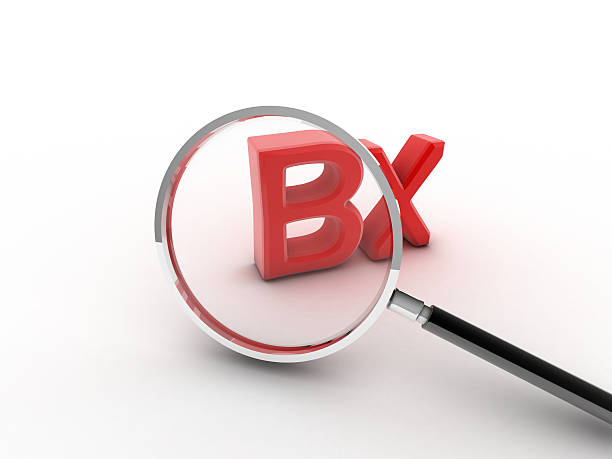
Why is Analysis important?
Analysis (Analytics) is an important step in on-page SEO that helps you evaluate your website’s performance and identify its strengths and weaknesses.
By analyzing data, you can improve your SEO strategy and achieve better results.
On-page SEO requires continuous analysis.
Analysis Tools
- Google Analytics: A free tool for website traffic analysis
- Google Search Console: A free tool for reviewing website performance in search results
- Ahrefs and Moz: Paid tools for website and competitor analysis
By analyzing data, you can identify successful keywords, popular pages, and technical issues on your site.
On-page SEO is a continuous process that requires ongoing analysis and improvement.
With on-page SEO, you can increase your site’s organic traffic.
In summary, on-page SEO is a valuable investment for any website looking for growth and success in the online space.
Frequently Asked Questions
| Question | Answer |
|---|---|
| What is On-page SEO? | On-page SEO refers to a set of actions performed within a website and on page content to achieve a better ranking in search results. |
| Why is On-page SEO important for a website? | On-page SEO helps search engines better understand your page content and assess its importance. It also provides a better user experience for visitors. |
| What are the most important on-page SEO factors? | The most important factors include keyword optimization, content quality, Title Tag, Meta Description, URL structure, Heading Tags (H1-H6), internal linking, and image optimization. |
| What role does the Title Tag play in on-page SEO? | The Title Tag is one of the most important on-page SEO factors that displays your page title in search results and browser tabs. It should include the main keyword and be engaging. |
| What is the importance of Meta Description in on-page SEO? | The Meta Description provides a summary of the page content, and although it does not directly affect rankings, it can increase the Click-Through Rate (CTR) by encouraging users to click. |
| How are keywords used in on-page SEO? | Keywords are phrases that users employ to search for information in search engines. Proper and natural use of them in content helps search engines identify the page’s topic. |
| What is internal linking and what are its benefits in on-page SEO? | Internal linking refers to creating links between different pages of a website. This helps distribute page authority, aids search engine crawlers, and improves user experience. |
| How does image optimization affect on-page SEO? | Image optimization includes compressing size, using appropriate Alt tags, and proper file naming. This improves page load speed and helps search engines understand image content. |
| What does quality content mean in on-page SEO? | Quality content means content that is comprehensive, accurate, unique, up-to-date, and user-friendly, addressing users’ needs. |
| What role does URL structure play in on-page SEO? | Readable, short, and keyword-rich URLs help search engines and users better understand page content and improve user experience. |
And other advertising services of Rasa Web Advertising Agency
- Smart Sales Automation: An effective tool to increase sales with the help of Google Ads management.
- Smart Sales Automation: An effective tool to increase click-through rates with attractive UI design.
- Smart Conversion Rate Optimization: A specialized service for growing user engagement based on Google Ads management.
- Smart Link Building: An effective tool to increase sales with the help of key page optimization.
- Smart Social Media: A specialized service for increasing sales growth based on SEO-driven content strategy.
And over hundreds of other services in the field of internet advertising, advertising consultation, and organizational solutions.
Internet Advertising | Advertising Strategy | Advertorials
Resources
On-page SEO Tutorial on Aparat
On-page SEO Tutorial on HamyarWP
What is On-page SEO? – SEO Edu
On-page SEO Checklist – MihanWP
? In the journey of your business’s digital transformation, Rasaweb Afarin Digital Marketing Agency, with expertise in professional website design and providing comprehensive solutions, is your trusted partner.
📍 Tehran, Mirdamad Street, next to Bank Markazi, Kazeroon Janubi Alley, Ramin Alley, No. 6




